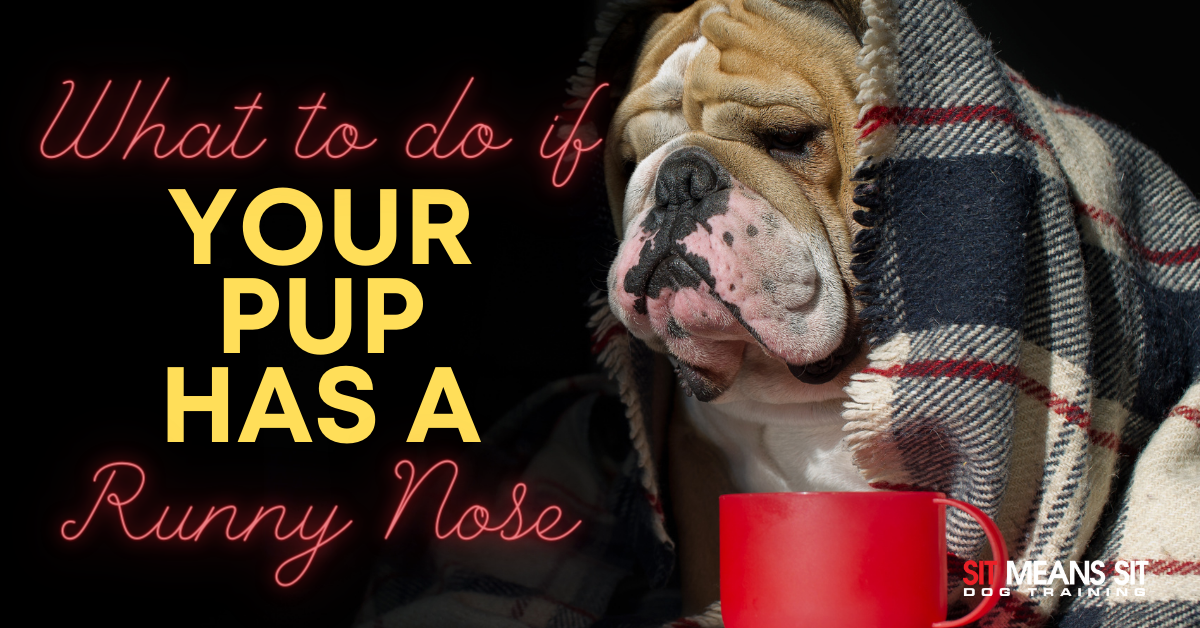
What to Do if Your Puppy Has a Runny Nose
Just like humans, dogs can sometimes get runny noses, especially when allergy season rolls around. If it’s just the occasional runny nose, you have nothing to worry about. But, if your dog has a constant runny nose or the discharge from their nose appears abnormal, this could be a cause for concern.
Here’s what to do if your dog has a runny nose.
Causes
Many things can cause a dog to have a runny nose, the most common being allergies. Like humans, dogs can suffer from seasonal allergies that can cause sneezing, itching, and yes, even a drippy nose.
However, sometimes it can also point to a more serious illness. If you believe this may be the case, it is important to take your pup to see the vet so they can get to the root of the issues and provide Fido with some relief.
Here are some possible things that could cause your dog to have a runny nose and some possible accompanying symptoms.
Allergies
Dogs can be allergic to specific foods, fleas, or other environmental allergens. Treatment usually requires keeping your dog away from the identified allergen.
If your dog has clear nasal discharge, here are some other signs to look for.
- Itching
- Sneezing
- Red or inflamed skin
- Ear infection
- Excessive licking
- Digestive issues
If your dog is having digestive issues, food is likely the cause of their discomfort. This means an allergy test or elimination diet may be necessary to identify the allergen.
Infections
There are a number of infections that can cause a runny nose in dogs. However, this is not a normal runny nose as the discharge will often be thick and have a green or yellow coloring. This points to a bacterial, viral, or fungal infection. Other symptoms may include:
- Coughing
- Nosebleeds
- Discharge that has an odor
Foreign Object
Dogs explore the world with their noses, which helps them get a better understanding of their surroundings, but can also land them in some trouble if they get something stuck in their nasal cavity.
As your dog sniffs, things can get sucked up and stuck in their nostrils such as grass, seeds, and wood splinters. When this happens, your dog’s nose can run as it tries to remove the foreign body, and they could also experience nosebleeds.
If you think your dog may have something stuck in their nose, seek treatment from a vet quickly in order to prevent infection or further injury.
Nasal Cancer
Although nasal tumors only make up an extremely small fraction of cancers in dogs, it is still a possibility. In order to diagnose a nasal tumor, your vet will need to order scans and they may need to perform a biopsy to confirm a carcinoma.
If your dog is diagnosed with cancer, there are a few possible treatments including radiation and surgery to help fight cancer.
Other symptoms of nasal tumors include nosebleeds, facial deformities, and neurologic abnormalities.
Temperature Regulation
Humans sweat over our whole bodies in order to maintain our body temperature. However, dogs can only sweat in a few places including the pads of the feet, and yes, sometimes their noses! This means that a runny nose could simply be your dog’s way of trying to cool down.
A runny nose due to heat will usually have a clear, thin discharge. If you believe this is the cause of your dog’s discomfort, try moving them to a cooler place, offering them some water, or turning on a fan or air conditioner.
Diagnose
The only way to be sure of the reason for your dog’s runny nose is to be officially diagnosed by a veterinarian. Keep track of your pet’s symptoms and report them to the vet for the most accurate diagnosis.
Your vet will probably review your dog’s medical history, breed information, the time of year, conduct a physical exam, and consider all symptoms before creating an accurate diagnosis.
Treatment
While many runny noses will just go away on their own, each cause of a runny nose has its own set of treatments, depending on the illness that is causing the nose to drip.
Allergies
In most cases, the easiest way to treat a dog’s allergies is to avoid the allergen altogether. However, this can be difficult if you aren’t sure what the allergen is. Allergy tests or elimination diets can be helpful in determining the root of the problem.
Infections
If your dog is suffering from an infection, your vet may recommend a course of antibiotics or antifungals, if the infection is bacterial or fungal. However, if the infection is viral, your vet may recommend some immune-boosting supplements to help aid the immune system in fighting the infection.
Foreign Object
If a foreign object is located in your dog’s nasal passage, it should be removed as quickly as possible by a professional. Do not try to remove the foreign body yourself as the nasal passage is very sensitive. This procedure needs to be performed while the dog is under anesthesia to keep them comfortable and prevent them from injuring themself further.
Overall, in most cases, a runny nose is nothing to be concerned about. However, if it is accompanied by other symptoms, reach out to your vet for professional guidance on what to do.
